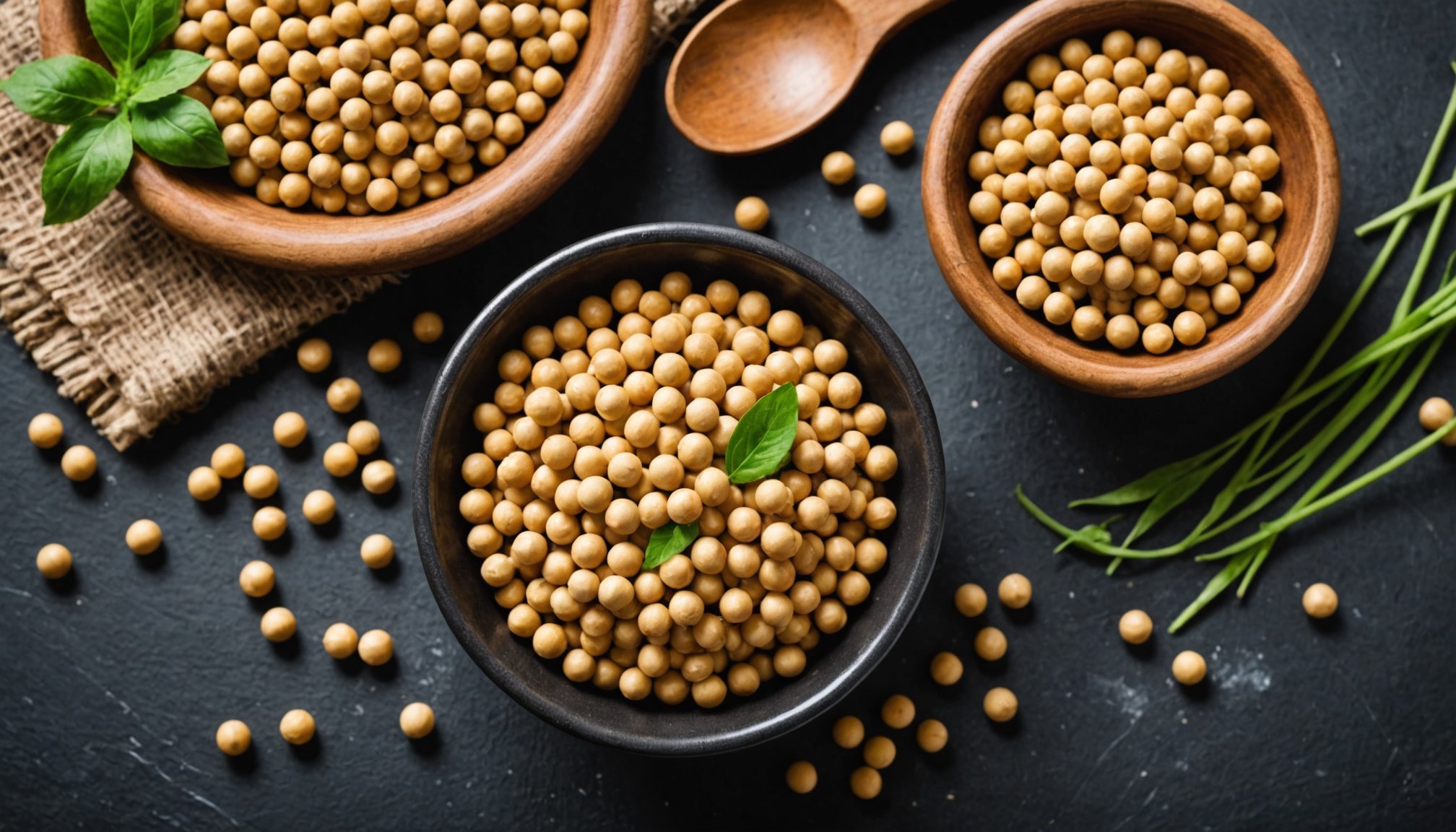Understanding How Soy Consumption Influences Menopausal Symptoms: Your Essential Handbook to Menopause and Soy Consumption
Menopause is a natural phase in a woman’s life, marking the end of her reproductive years. This transitional period is characterized by significant hormonal changes, particularly a decrease in estrogen production by the ovaries. These hormonal fluctuations can lead to a wide range of symptoms, including hot flashes, mood swings, heavy periods, vaginal dryness, fatigue, and sleep disturbances. One natural remedy that has gained attention for alleviating these symptoms is soy, specifically the isoflavones found in soy products.
What are Isoflavones and How Do They Work?
Isoflavones are plant compounds known as phytoestrogens, which are naturally occurring nonsteroidal compounds derived from plants that resemble estrogen. The most common isoflavones found in soy are genistein and daidzein. These compounds interact with estrogen receptors in the body and can mimic the effects of estrogen, although they do not bind to all estrogen receptors equally[1][3][5].
In the same genre : Enhancing emotional well-being: discover the unexpected psychological benefits of sharing family meals
According to Viscardi, a registered dietitian involved in a University of Toronto study, “We have estrogen receptors throughout our bodies but, contrary to the hormone estrogen, isoflavones from soy don’t bind to all the estrogen receptors equally. That’s why we see a beneficial effect on the cardiovascular system and no effect on the female reproductive system.”[1]
Alleviating Menopausal Symptoms with Soy
Soy isoflavones have been shown to alleviate several menopausal symptoms, particularly hot flashes and night sweats.
Also to read : Transforming healing: how guided meditation apps are helping veterans combat ptsd symptoms
Hot Flashes and Night Sweats
Research has consistently shown that isoflavones in soy products can reduce the frequency and severity of hot flashes. A systematic review and meta-analysis found that taking soy isoflavone supplements led to a 20% reduction in the frequency and severity of hot flashes compared to the placebo group. The effects were more pronounced when the amount of genistein isoflavone was 19 milligrams (mg) or higher[3].
Other Menopausal Symptoms
In addition to hot flashes, soy isoflavones may help with other menopausal symptoms such as vaginal dryness and mood swings. The estrogen-like effects of isoflavones can help maintain skin hydration and support the production of structural proteins like collagen and elastin, which are crucial for skin health[2].
Health Benefits of Soy Consumption for Postmenopausal Women
Soy consumption offers several health benefits beyond just alleviating menopausal symptoms.
Cardiovascular Health
Soy intake has been associated with improved cardiovascular health. The risk of cardiovascular disease increases substantially as women go through menopause, and soy can offer dual benefits during this phase. Soy foods help lower cholesterol, improve blood pressure, and reduce the risk of heart disease and stroke[1][3].
Bone Health
Soy isoflavones promote bone health in postmenopausal women. Studies have shown that women with moderate to high soy intake have a one-third reduction in the risk of fractures related to osteoporosis. Soy isoflavone supplements at 105 mg/day were found to increase bone mineral density by about 7.5%, which is approximately half the increase obtained with risedronate, a drug used to treat osteoporosis[3].
Anti-Inflammatory Effects
Soy intake has also been linked to reduced inflammation. A systematic review and meta-analysis showed a 22% reduction in C-reactive protein (CRP) in postmenopausal women with high baseline CRP concentrations after soy intake compared to controls. Inflammation plays a key role in many chronic health conditions, and reducing CRP levels can be beneficial for overall health[3].
Potential Risks and Considerations
While soy consumption has several benefits, there are also potential risks and considerations to be aware of.
Cancer Risk
One of the primary concerns is the potential impact of soy isoflavones on cancer risk. However, a systematic review and meta-analysis by University of Toronto researchers found that isoflavones had no effect on key markers of estrogen-related cancers, supporting the safety of soy as a food and potential therapy[1].
Breast Cancer
The relationship between soy intake and breast cancer is complex. Some studies suggest that soy protein isolate may stimulate estrogen-positive breast tumor growth, while others indicate that moderate soy intake may reduce the risk of breast cancer. It is crucial to note that the effects can vary depending on the type of soy product and the individual’s health status[4].
Thyroid Function and Male Fertility
Soy phytoestrogens can also affect thyroid function and male fertility. High intake of soy isoflavones may interfere with thyroid hormone production and affect male fertility due to their estrogen-like effects. However, these effects are generally seen with very high consumption levels and are less likely to be a concern for most people[3].
Practical Advice for Incorporating Soy into Your Diet
Here are some practical tips for incorporating soy into your diet to manage menopausal symptoms and benefit from its health advantages:
Choose Whole Foods Over Supplements
Opt for whole soy foods like tofu, tempeh, edamame, and miso rather than supplements. Whole foods provide a balanced mix of nutrients and are generally safer and more effective[5].
Moderate Intake
Aim for moderate soy intake, around 50 grams per day. High doses of isoflavones may not provide additional benefits and could potentially have adverse effects[5].
Fermented Soy Foods
Fermented soy foods like miso and tempeh are particularly beneficial due to their improved digestibility and added probiotics. These foods can enhance the nutritional value and reduce any potential negative effects of soy consumption[3].
Detailed Benefits and Considerations Table
| Benefit/Consideration | Description | Studies/Findings |
|---|---|---|
| Hot Flash Relief | Reduction in frequency and severity of hot flashes | 20% reduction with 19 mg genistein[3] |
| Cardiovascular Health | Lower cholesterol, improved blood pressure, reduced heart disease and stroke risk | Improved cardiovascular outcomes in postmenopausal women[1][3] |
| Bone Health | Increased bone mineral density, reduced risk of fractures | 7.5% increase in bone mineral density with 105 mg/day isoflavones[3] |
| Anti-Inflammatory Effects | Reduced C-reactive protein levels | 22% reduction in CRP levels[3] |
| Cancer Risk | No significant impact on estrogen-related cancer markers | No effect on key estrogen-related cancer markers[1] |
| Breast Cancer | Complex relationship; potential stimulation of estrogen-positive tumors, but also possible reduction in risk | Mixed findings depending on type of soy and individual health[4] |
| Thyroid Function and Male Fertility | Potential interference with thyroid hormone production and male fertility | High intake levels may cause these effects[3] |
| Skin Health | Improved skin hydration, increased collagen and elastin production | 9.46% increase in epidermis thickness and increased elastic fibers[2] |
Real-Life Examples and Anecdotes
Many women have found relief from menopausal symptoms by incorporating soy into their diets. For example, a study involving 30 postmenopausal women who received a treatment of 100 mg/day of an isoflavones soy extract for six months showed significant improvements in skin health, including a 9.46% increase in the thickness of the epidermis and an increase in the number of elastic fibers[2].
Soy consumption can be a valuable addition to the diet of postmenopausal women, offering relief from menopausal symptoms and various health benefits. However, it is important to be aware of the potential risks and to consume soy in moderation, choosing whole foods over supplements.
As Chiavaroli from the University of Toronto notes, “We hope our study will help people feel more comfortable including soy foods in their diet without being concerned that it’s going to increase their risk of estrogen-dependent cancer.”[1]
By understanding the benefits and considerations of soy consumption, women can make informed decisions about their diet and health during the menopausal transition.
Additional Tips and Recommendations
- Consult a Healthcare Provider: Before making significant changes to your diet, especially if you have underlying health conditions or concerns, consult with a healthcare provider.
- Monitor Your Body’s Response: Pay attention to how your body responds to soy intake. If you experience any adverse effects, adjust your consumption accordingly.
- Combine with Other Healthy Habits: Soy consumption should be part of a balanced diet and a healthy lifestyle that includes regular exercise, adequate sleep, and stress management.
By integrating these tips and recommendations into your daily life, you can harness the benefits of soy while minimizing any potential risks.





